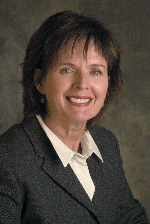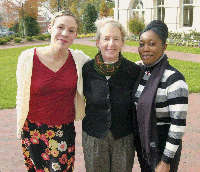New Developments

Kathleen Egan
Building
Our Programs
I’m delighted to be at the School of Nursing as the new director
of development. As I’ve had the pleasure of talking with other staff,
faculty, students, alumni, and volunteers over the past several months,
it’s been quite clear to me what a really remarkable place this is.
The Nell Hodgson Woodruff School of Nursing occupies a distincttive niche—and
is a leader—among schools of nursing, in part because of its emphasis
on preparing nurses who improve nursing practice in this country and globally.
Nursing education has never been more important. We have a great story
to tell, and I look forward to building on the effective development programs
that have led to successes like The Helene Fuld Health Trust grant (see
“Nurturing Social Responsiblity” below).
Joining me in this endeavor are two new colleagues, Amanda Kudla, assistant
director for alumni relations, and Angela Yvonne, development associate.
We hope to meet many of you in the near future and invite you to call
on us to share your perspectives and ideas.
Kathleen
Egan
Director of Development
Keep in Touch
You may contact Kathleen Egan at (404) 727-2569 or kegan2@emory.edu.

Ann
Connor (center) serves as
mentor to Fuld Fellows Kelly
Moynes (left) and Cicely Ross.
A third Fuld Fellow, Emile Crosa,
has joined the Nursing Segue Program.

Receiving the Fuld gift coincides with the school’s efforts to formalize its service learning programs.

Nurturing
Social Responsibility
Historic gift supports
new segue program
Nursing junior Cicely
Ross not only wants to be a nurse, but she also hopes to reach patients
who miss out on the benefits of quality health care.
“I’d like to become involved with a nonprofit organization that
offers help to economically challenged families, such as homeless people
and migrant workers,” says Ross, a former respiratory therapist and
medical ophthalmic technologist. “I believe we can make a difference
by achieving a healthy environment and decreasing the rates of occupationally
related injuries and illnesses.”
Ross is reaching for her goal as one of the first Fuld Fellows in the
School of Nursing. She and two other juniors are enrolled in the Emory
Nursing Segue Program for students who have bachelor’s degrees in
other fields. The program is being funded with $5 million from The Helene
Fuld Health Trust, the largest single gift in the school’s history.
It provides a scholarship endowment for Segue Program students, who will
earn both bachelor’s and master’s degrees in nursing after three
years of study.
“Typically, students who enter school for a second baccalaureate
degree have exhausted their eligibility for federal loans,” says
Anne Bavier, assistant dean for planning and external relations. “Their
eligibility for student loans is jeopardized because they usually have
been employed and have income. Thus, these endowment funds are a wonderful
resource to ensure the participation of dedicated students.”
With the nation experiencing an unprecedented nursing shortage, Emory
nursing leaders see the Segue Program as a way to produce more nurses
and expand the leadership pool within the field.
“Students who come to nursing with degrees from other fields bring
a special capacity for caring,” says Dean Marla Salmon. “Their
grounding in arts and sciences positions them to lead nursing in improving
health care. The Fuld gift enables these students to realize their enormous
potential, which in turn benefits all society.”
Prior to receiving the gift, the School of Nursing conducted a successful
Segue pilot program that highlighted the need for scholarships to support
students who demonstrate exceptional clinical and academic performance.
“The Fuld gift has generously addressed this need,” says Salmon.
“Our undergraduate faculty are working closely with Segue students
to select clinical placements that will enhance their capacity for excellence
and leadership while moving toward a nursing practice specialty.”
Ann Connor, assistant professor (clinical) in the Department of Family
and Community Nursing, works closely with the Fuld Fellows. She is a natural
for the program, given her history of serving the homeless in Atlanta.
“The Segue Program is a good fit for me since I have spent most of
my nursing career working with those at the margins of society,”
says Connor. “Serving as mentor for a program that focuses on social
responsibility is a gift for me.”
News of the Fuld funding coincides with the school’s efforts to formalize
its service learning programs. Students will have a chance to provide
health care services in migrant farm communities, join a health care expedition
to Haiti or Cuba, or conduct health screening and education programs at
an inner-city high school. These programs are based in the new Office
of Service Learning. (See the related story “Powerful
Lessons” for more details.)
The Fuld endowment will be distributed in $1 million annual installments
for five years. In addition, the Fuld Health Trust granted a cash amount
to aid the first group of students while the endowment grows. Preparing
these students well is crucial to meeting the demands of the nursing profession.
“Declining enrollments in nursing schools, drastic changes in the
financing and organization of health care systems, and rapid technological
advances in all aspects of health care contributed to the current nursing
shortage,” Salmon says. “The Segue Program will produce more
nurses and a leadership corps with a broad background to find innovative
solutions to our health care challenges.”
Shaping
Leaders in Clinical Care
Hearst scholarship targets graduate students
Graduate nursing students aspiring to become leaders in the clinical setting have a new scholarship resource from the Hearst Foundation Inc. The School of Nursing recently received a $150,000 grant to establish The William Randolph Hearst Endowed Scholarship fund for graduate nursing students, which will be available to them this fall.
“This grant supports the nursing school’s efforts to prepare nursing leaders who can help rethink and reshape how patient care is delivered,” says William Fox, senior vice president for institutional advancement at Emory, who collaborated with nursing Dean Marla Salmon to obtain the grant. “It is designed to help experienced nurses working in areas such as acute and critical care, gerontology, nurse midwifery, and pediatrics.”
By supporting graduate nursing education, the Hearst grant enables the School of Nursing to further address the national nursing shortage in the clinical setting. It also makes advanced study more affordable for graduate students, given the decline in federal and other funding for nursing education.
“Previously, health care organizations provided significant support for nurses to advance their education, but changes in health care systems and costs have greatly reduced these resources,” says Salmon. “This endowment will provide a designated source of funds for future nurses to pursue graduate nursing education, regardless of the variations in employer resources. We are thankful to the Hearst Foundation for recognizing this and providing this resource.”
Based in New York City, the Hearst Foundation maintains a strong interest in education, with an emphasis on higher education in teaching and health care. Additionally, it seeks to make quality health care more accessible for underserved populations, find effective solutions to social and economic problems, and engage young people in cultural activities, primarily through arts-in-education programs. The foundation bears the name of the late philanthropist and newspaper owner, William Randolph Hearst.